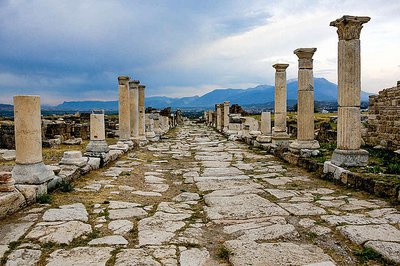Thoughts for the Day
Sunday, 31st December 2023: The supremacy of Christ
1 Colossians 1 Jesus Christ Colossians
Reading : Verses from 1 Colossians, Chapter 1

* Colossae today
May you be made strong with all the strength that comes from his (Christ) glorious power, and may you be prepared to endure everything with patience, while joyfully giving thanks to the Father, who has enabled you to share in the inheritance of the saints in the light. He has rescued us from the power of darkness and transferred us into the kingdom of his beloved Son, in whom we have redemption, the forgiveness of sins.
He is the image of the invisible God, the firstborn of all creation; for in him all things in heaven and on earth were created, things visible and invisible, whether thrones or dominions or rulers or powers—all things have been created through him and for him. He himself is before all things, and in him all things hold together. He is the head of the body, the church; he is the beginning, the firstborn from the dead, so that he might come to have first place in everything. For in him all the fullness of God was pleased to dwell, and through him God was pleased to reconcile to himself all things, whether on earth or in heaven, by making peace through the blood of his cross.
(Lectionary, New Revised Standard Version)
Thoughts
This passage from the first letter to the Colossians gives us a passage of such difficulty and such importance that we could write books about it and still not explore all that it means. But on New Year's Eve as we Christians glance back over the last year, perhaps we can look at one particular section, at the supremacy of Christ.
This epistle is a powerful argument against the Gnostics, those Gentiles who, followed Greek thought and believed that Jesus was just another inferior god. Gnostics believed that all matter was evil but eternal, and that only spirit was good. They further believed that since God was spirit and therefore perfect He could not have made the world out of this evil matter. So for them a lesser being must have created the world. Jesus as a human being could therefore not claim parity with God, and must be something inferior.
The Letter to the Colossians is adamant that Jesus is the 'image of the invisible God', and that it was He who created the world. The Greek word for 'image' is 'eikon' which is something more than an image, rather it is like the actual thing itself. The writer of Colossians is arguing that if we want to know what God is like we only have to look at Jesus. He shows us what God is like in human form.
In other words Jesus shows us that God is gracious, He is patient, He is kind, He keeps His promises, He is forgiving, and ultimately He loves all who follow Him.
Prayer
Lord Jesus
help us to remember that You
are the Christ,
who lived on earth
as the living 'eikon' of God,
and that when we want to see God
we only have to look at You.
May we not be ashamed
to announce to others
that we are Christians -
followers of the living God.
Amen.
You might like to look at this site:
Or listen to this by Chet Valley Churches, with lyrics: